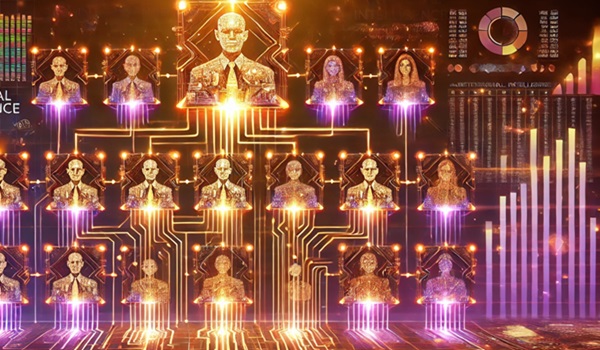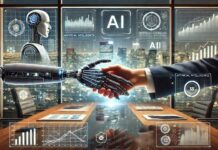Each week we find a new topic for our readers to learn about in our AI Education column.
This week in AI Education, we’re going to tackle another one of those ubiquitous artificial intelligence terms that nobody ever seems to want to define for their readers: Enterprise AI.
Before we get into the definitions and descriptions, however, let’s have a talk about jargon and technical terminology. AI & Finance, like its parent publication, Digital Wealth News, exists at the intersection of two industries notorious for confusing consumers and investors alike with ill-defined, confusing terminology. Sometimes it seems like there are so many undefined terms being thrown around that the confusion is intentional—like industry thought leaders and company management doesn’t want the outside world to know what they’re up to.
Of course, in the post global financial crisis world, this type of behavior has been widely panned in finance but is still everywhere. In technology, it’s a way of life—it’s like the knowledge workers in tech are building a lexicological moat around themselves to protect from outside observation and criticism. Concepts that should be simple and self-evident are thus obfuscated—rather than learning more, the lay person just gives up and capitulates to the self-declared experts.
Well, I’m not giving up that easily.
That brings us back to enterprise AI, which, like all AI thus far, is just software and really no different from enterprise software except it comes with the distinction of using artificial intelligence technology. Of course, that begs the next question—what do tech people really mean when they say “enterprise software?” It sounds so mundane and innocuous—but it could also be provocative and, dare we say, potentially revolutionary.
What Is Enterprise AI
Per IBM, enterprise artificial intelligence “is the integration of advanced AI-enabled technologies and techniques within large organizations to enhance business functions.”
While we’ve spent some time talking about the deployment of artificial intelligence to complete specific tasks at specific points, like reading and parsing documents or writing answers to questions in natural language, enterprise AI is an artificial intelligence application that resides above and across all of the functions of a business. Enterprise AI can encompass both our previously discussed specific AI functions as well as higher operational and strategic functions within a business, like overall performance metrics and efficiency.
In other words, when we read the phrase “enterprise AI” we should automatically assume that we’re talking about something greater than a point solution aimed at a specific problem—enterprise AI is like a next-generation operating system for businesses of many, many different stripes. While most of the AI we’ve discussed thus far is aimed at aiding, automating and displacing rank-and-file workers and their tasks, enterprise AI can also be aimed at a business’s executive and management functions.
What Does Enterprise AI Do?
Like any AI, enterprise artificial intelligence requires data—lots of it. However, rather than focusing on huge data sets, like a large language model using large parts of the internet to learn how to understand and answer user queries, enterprise AI is most concerned with data collected from the business it is deployed within. In this case, AI uses some of the tools we’ve already explained in AI Education, like machine learning and computer vision, to understand a business’s processes and functions and to find ways to accelerate or automate them.
This all may sound very abstract, but the consequences are quite specific—in analyzing a business’s processes, an enterprise AI may be applied to supply chains, marketing, security, customer service and more. Traditional managers may use the AI’s performance indicators to discover efficiencies for themselves, while subordinates may find new ways to optimize their workflows. This technology is already out in the open, being deployed in the real world.
Enterprise AI Applications
Again drawing from IBM’s expertise, there are several interesting ways that enterprise AI is already enhancing businesses.
In supply chain management, AI tools are being used to forecast demand and optimize inventory levels. They can also be used to find or predict supply chain disruptions, and to close or mitigate gaps. Similarly, in human resources, AI is being used to identify optimal candidates for open roles and to analyze employee performance to find outstanding and suboptimal workers. The same capabilities can also be used to manage a company’s financial and accounting functions.
In security, enterprise AI is already being used to detect financial fraud by flagging unusual activities. As it turns out, AI is better and understanding the patterns of financial transactions than human observers and is often quicker to realize when something is going wrong. Similarly, artificial intelligence is quickly becoming the cybersecurity watchdog for businesses, as it is able to identify and mitigate threats faster than human IT and IS professionals.
Enterprise AI is also being used to personalize customer service experiences and marketing campaigns down to the household and individual level. Artificial intelligence can augment, enhance and then analyze the data within an organization’s CRM to make any and every experience unique to the prospect or client.
Whoa There
Does this all sound revolutionary? It does to me. In fact, it sounds like this is the kind of concept that can, well down the road, lead to autonomous business entities that no longer need human management to function. If we take a ride all the way down the slippery slope, we’re not just talking about disintermediating tasks or displacing workers, but of fully digitizing and automating the enterprise itself, top to bottom, from the CEO to the janitorial staff.
But that’s not really what today’s enterprise AI is supposed to be about—rather, it’s about finding new opportunities for saving or revenue enhancement within a company. The firms selling enterprise AI—like Amazon, IBM and Microsoft—will tell you that it’s really about “liberating” workers of all stripes from boring, mundane tasks so that they can be reskilled to do something more interesting or exciting.
I hate to break it to these companies, but work by its very nature is defined by mundane tasks. At a certain point, there’s nothing left for us to be reskilled for. We can’t all be creatives—some people might argue the world already has enough creatives as it is. Advances like enterprise AI seem to be accelerating humanity towards a post-work, post-labor reality where even the highest-level executive is no longer necessary for a healthy economy to function.
The implications for entrepreneurs are even more intriguing—business ideas will be able to move from concept to reality rapidly, with little capital, on an AI business operating system that can automatically scale in real time with the enterprise as needed, all the way from local small startup to multinational conglomerate.
Is anybody really ready for such a future?







